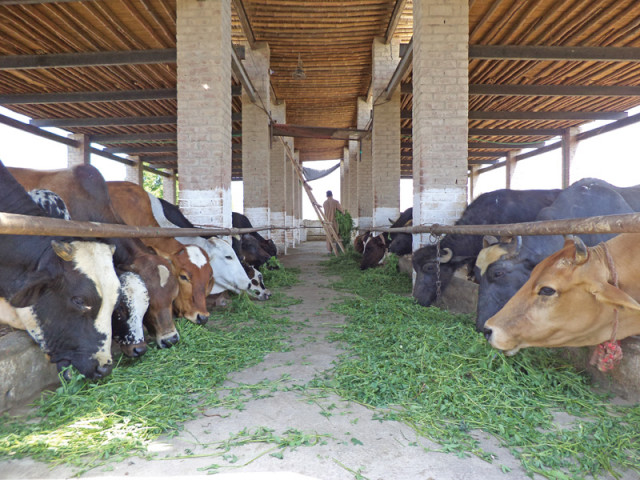Formal sector divided over form of processed milk
Contrasting views on preference over UHT or pasteurised milk.

Cattle’s milk undergoes the ultra-high temperature process that does not require cold storage and hence works in Pakistan that is already suffering from an energy crisis. PHOTO: FILE
Engro Foods and Nestle Pakistan – the major dairy companies that collectively account for more than 80% of the processed milk market – express support for different technologies. While the former sees pasteurised milk as the way forward, the latter says ultra-high temperature (UHT) milk is more suitable for the Pakistani market.
Both UHT and pasteurised milk are processed. The difference, in terms of ingredients, is that of fat content. Unlike UHT milk, which is standardised to bring the fat level of the entire milk body to 3.5%, pasteurised milk or informal loose milk offers a consistent cream [fat] level of 6%.
The other major difference is that in their shelf life. UHT milk does not require cold storage and can be kept for up to 90 days so long as the carton’s seal is intact. However, pasteurised milk’s life is two to three days if stored at or below 4˚C – the two also taste different because of the different levels of fat content.
“The dairy sector has stages of development. First, you switch from loose milk to UHT milk. Then comes pasteurised and finally the industry moves towards bi-products of milk, such as cheese and butter,” said Sarfaraz Rehman, chief executive officer at Engro Foods – a major diary company and a subsidiary of Pakistan’s largest private sector conglomerate Engro Corp.
“We feel the stage for pasteurised milk has come. This segment is growing very fast in Lahore and increasing in Karachi as well.”
In fact, the local giant has already taken the first step in this direction – it entered the loose milk segment last year by launching its own pasteurised milk brand “Mabrook”, which is sold as loose milk.
The company insists it to be a pilot project to gain consumers’ insight but market sources say the move was Engro Foods’ response to the informal loose milk sector, which accounts for nearly 90% of the country’s fresh milk trade (20 billion litres a year). Moreover, the company is possibly checking consumers’ response to pasteurised milk.
According to Rehman, the share of pasteurised milk is not more than 500,000 litres per day.
The other side
By contrast, Waqar Ahmed, head of corporate affairs at Nestle Pakistan, was of the view that switching to pasteurized milk was economically unviable for the country. “Pasteurised milk can’t survive without a proper cold chain, which needs enough energy,” he said. The country is not producing enough energy while importing the same would increase the per-litre cost of milk manifold, he added.
Tetra Pak, Pakistan – a subsidiary of Sweden-based packaging giant and single largest player responsible for the UHT food packaging in the country – shared a similar view.
“Any type of packaged milk is better than loose milk. But UHT is more suitable to Pakistan’s needs,” said Osman Bucha, marketing director at Tetra Pak.
“If we see value chain, pasteurised milk in Pakistan is more expensive than UHT and less beneficial to us as a country,” Tetra Pak’s marketing head said. “For pasteurisation, you have to maintain a cold chain and for that you need energy,” he said.
The country needs to produce enough energy to develop the infrastructure for pasteurisation, according to Bucha. Pakistan generates energy mostly from oil, increasing the cost, he added. Secondly, he says, this is not beneficial if analysed from a balance of payment point of view.
According to Bucha, Tetra Pak currently don’t find the pasteurised milk segment feasible for Pakistan.
“Our milk is largely produced in Punjab but it has to be dispatched to around 700,000 milk shops across Pakistan including remote areas in all four provinces and mountain regions, which don’t have cold chain,” said Bucha. Given short life span of pasteurized milk, it is not suitable for this market, he said.
Pakistan is not the only country where UHT is dominant over pasteurised milk, but Brazil, Mexico, Spain, Italy and Russia are also among examples, added Bucha.
Admitting that pasteurised milk’s share is growing significantly in Lahore, Bucha said it was limited to the urban centres and sold mainly through supermarkets due to a lack of proper cold chain.
Despite the country’s worsening energy situation, Engro Foods’ chief is optimistic about the growth of pasteurised milk.
“Once the energy crises are resolved, the demand for pasteurised milk will increase significantly,” Rehman said. “Pasteurised is not today’s market, it may take five to seven years to develop.”
Published in The Express Tribune, May 5th, 2014.
Like Business on Facebook, follow @TribuneBiz on Twitter to stay informed and join in the conversation.



















COMMENTS
Comments are moderated and generally will be posted if they are on-topic and not abusive.
For more information, please see our Comments FAQ